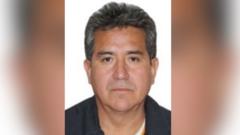In a significant move, Bolivia has extradited its former anti-drugs director, Maxilimiano Dávila, to the United States, where he is slated to face serious drug trafficking charges. Dávila, who is also known by the nickname "Macho", has been accused of enabling cocaine smuggling operations to the US during his tenure as the head of Bolivia's anti-narcotics agency. The Supreme Court of Bolivia sanctioned his extradition late in November, resulting in his departure on Thursday. Dávila, who refutes the allegations against him, had been detained in Bolivia since February 2022 on corruption charges.
The accusations against Dávila saw their formalization earlier in 2022, as US prosecutors unveiled an indictment accusing him of cocaine trafficking alongside a related charge concerning weapons. The US Department of State contends that Dávila leveraged his official role to protect aircraft utilized for cocaine transportation destined for the United States and other countries. Should he be found guilty of these charges, he is looking at a minimum incarceration period of ten years and a maximum sentence of life imprisonment.
The department notably issued a reward of up to $5 million for information leading to his conviction. Dávila served as the Bolivian Special Forces for Drug Trafficking (FELCN) director during the presidency of Evo Morales, who ruled from 2006 until 2019. Following Dávila's extradition, Morales took to social media to express his discontent, labeling Bolivia as a “US Colony”. He asserted that Bolivians are being unjustly handed over to the US, violating international legal agreements by not being tried in their homeland where the alleged crimes occurred.
Interestingly, Morales himself is currently under investigation for allegations of statutory rape and human trafficking, which he vigorously denies. His supporters recently organized protests across Bolivia, demanding an end to the inquiry against him. Moreover, Morales has claimed that he was the target of an assassination attempt, showcasing evidence that he believes substantiates his claims. However, the Bolivian government has refuted the notion that it was involved in any alleged attack against him, adding further complexity to the political climate in the country amid these developments.
The accusations against Dávila saw their formalization earlier in 2022, as US prosecutors unveiled an indictment accusing him of cocaine trafficking alongside a related charge concerning weapons. The US Department of State contends that Dávila leveraged his official role to protect aircraft utilized for cocaine transportation destined for the United States and other countries. Should he be found guilty of these charges, he is looking at a minimum incarceration period of ten years and a maximum sentence of life imprisonment.
The department notably issued a reward of up to $5 million for information leading to his conviction. Dávila served as the Bolivian Special Forces for Drug Trafficking (FELCN) director during the presidency of Evo Morales, who ruled from 2006 until 2019. Following Dávila's extradition, Morales took to social media to express his discontent, labeling Bolivia as a “US Colony”. He asserted that Bolivians are being unjustly handed over to the US, violating international legal agreements by not being tried in their homeland where the alleged crimes occurred.
Interestingly, Morales himself is currently under investigation for allegations of statutory rape and human trafficking, which he vigorously denies. His supporters recently organized protests across Bolivia, demanding an end to the inquiry against him. Moreover, Morales has claimed that he was the target of an assassination attempt, showcasing evidence that he believes substantiates his claims. However, the Bolivian government has refuted the notion that it was involved in any alleged attack against him, adding further complexity to the political climate in the country amid these developments.






















